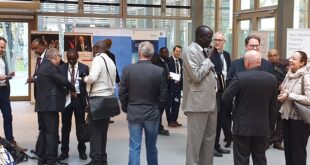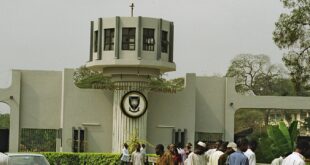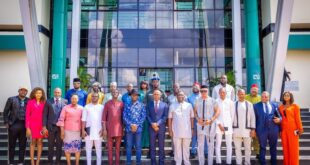German Chancellor Angela Merkel hosted African leaders to a meeting in Berlin on Tuesday. The summit, the third within the framework of the G20 Compact with Africa (CwA) initiative, seeks to promote increased private sector investment in Africa.
At a meeting at the federal chancellery attended by representatives of the 12 partner countries of the CwA and South Africa, being a G20 partner itself, Merkel said the initiative is a good example of “lived multilateralism”.
“Honest analyzes” are needed, the Chancellor told her audience including 7 presidents and the heads of multilateral institutions such as the World Bank, African Union, African Development Bank and International Monetary Fund. “What are the advances we have made, what are the handicaps we still have, which barriers are still open?”
She said the discussions within the context of the CwA initiative are about “really getting things done”.
Merkel pointed out that a “demanding youth” in Africa expects politicians to act and results to be visible, a veiled reference to the crisis of youth unemployment in most African countries. The German leader called for courageous reforms to improve the investment climate in Africa.
Merkel explained that not only the German but also European businesses had to be encouraged to invest in Africa. There are many potential investors who are “not sufficiently familiar” with the situation in these countries, she said. The German leader called for more transparency, which again is a veiled reference to the need to fight corruption in the bureaucracy of many countries on the continent.

“We believe that more transparency could also bring more investors into these countries, because for the investors from Germany and the G20 countries, transparency and trust are very important,” Merkel said.
Egypt’s President Abdel Fattah el-Sissi, who also holds the rotating presidency of the African Union this year, in his speech called for more investments in Africa as they have an important role to play in promoting stability and prosperity in the continent.
“We have strong potential, a strong political will and a clear vision. Investments play a major role to strengthen the domestic African markets. In the last years we have shown that Africa is one of the strongest regions in terms of development and trade,” he said.
An investment conference organized by Afrika-Verein (Africa Association of German Business) in collaboration with the Sub-Saharan Africa Initiative of German Business (SAFRI) accompanied the summit.
The ‘G20 Investment Summit-German Business and the CwA Countries’, which was opened by Chancellor Merkel, provided a forum for African leaders to advertise their investment opportunities to German companies. It also offered opportunities for German companies to make investment proposals to the African leaders.
The potential for German investment in Africa is great. Currently, only about 600 German companies are doing business in Africa with the continent accounting for only 2% of German foreign investment. The main barrier to Germans investing more in Africa is the risk involved; risk of policy somersault, changes in government policies, official arbitrariness etc. Since the overwhelming majority of German investors are small and medium-size companies, any investment gone wrong could threaten their very existence, say analysts.
Stefan Liebing, chairman of Afrikaverein, called on the German government to improve the conditions for public guarantees for German companies wanting to do business in Africa to mitigate these risks.
Critics say the interest in the initiative is waning as only 7 African heads of states attended this year. However, African leaders do not need to come to Berlin to take lessons on how to attract foreign investment. They should know that without peace, stability and rule of law with a transparent bureaucracy, few long-term investors would like to do business in the continent.
Sola Jolaoso
 THE AFRICAN COURIER. Reporting Africa and its Diaspora! The African Courier is an international magazine published in Germany to report on Africa and the Diaspora African experience. The first issue of the bimonthly magazine appeared on the newsstands on 15 February 1998. The African Courier is a communication forum for European-African political, economic and cultural exchanges, and a voice for Africa in Europe.
THE AFRICAN COURIER. Reporting Africa and its Diaspora! The African Courier is an international magazine published in Germany to report on Africa and the Diaspora African experience. The first issue of the bimonthly magazine appeared on the newsstands on 15 February 1998. The African Courier is a communication forum for European-African political, economic and cultural exchanges, and a voice for Africa in Europe.























